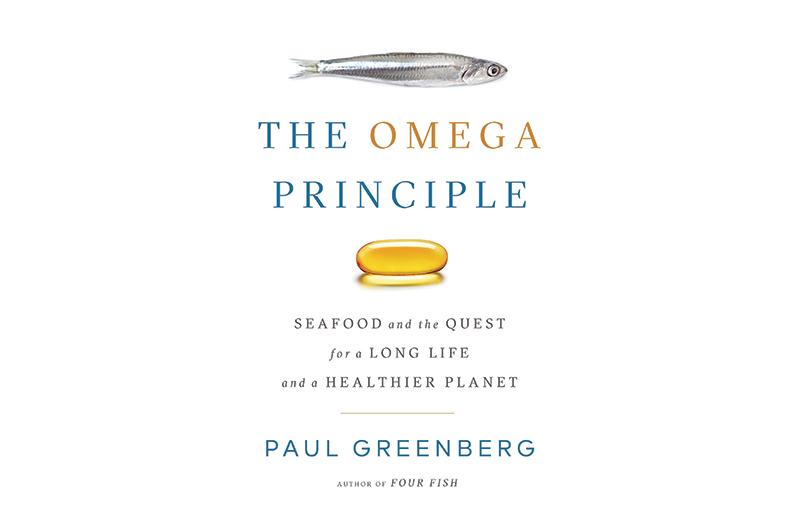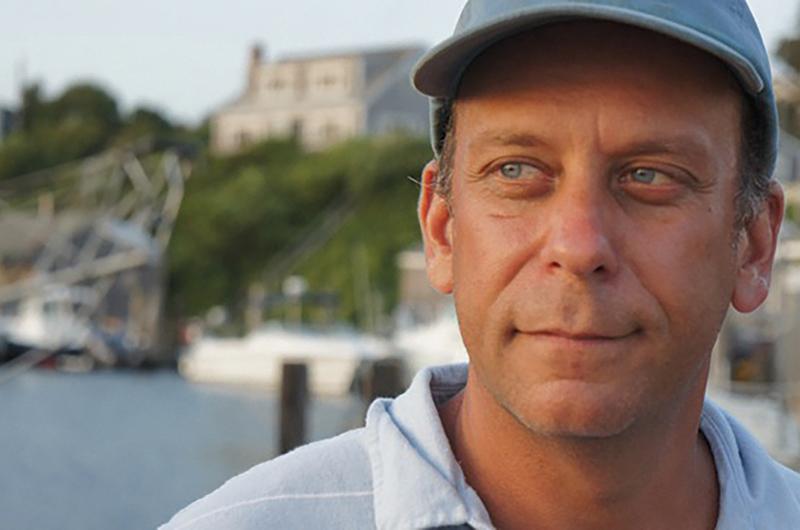It began, in part, because of Paul Greenberg’s dread of middle age, his elevated blood pressure and cholesterol levels, and a lurking fear of The Big One. “A little while back I learned from an eminent cardiologist that half of all patients first report heart disease to their physicians by dropping dead,” he wrote in his newest book, The Omega Principle: Seafood and the Quest for a Long Life and a Healthier Planet, characteristically delivering a startling data point wrapped in humor.
So it made sense that Greenberg would pursue a heart-healthy fish diet on the one hand and research the promise of fish oil supplements on the other. And while he sought a path to his own health, he would examine the health of our oceans – after all, they are approaching their own middle age at 4 billion years old, and perhaps their own version of The Big One.
There may be no better person for such an endeavor. Greenberg, an avid angler who has been a frequent summer visitor to the Island since childhood, is to ocean fish and other seafood what Boswell was to Dr. Johnson, this generation’s most adept chronicler of the edible wildlife in our oceans. In 2010, he examined the plight of four signature wild fish – salmon, sea bass, tuna, and cod – and their precarious existence in his book Four Fish: The Future of the Last Wild Food, which won the 2011 James Beard Award for writing and literature. In his 2014 book American Catch: The Fight for Our Local Seafood, he explained the dynamics of the fishing industry and why more than 90 percent of the seafood we eat is from overseas.
This summer he published The Omega Principle, the third book in his fish trilogy. It examines the potential of omega-3 fatty acids to help heal hearts and supercharge brain function, as well as America’s obsession for a pill that delivers those same omega-3s to counteract a lifetime of unhealthy diets.
It required a very deep dive into mind-numbing medical studies, statistics, and marine biology. It took him from salmon farms in Norway to krill fishing in Antarctica, a Peruvian anchoveta boat to a mussel-farming experiment in the Bronx River estuary. What he surfaced with is a troubling fishing tale that should make us all sit up.
One central theme of his research was to determine whether increased consumption of omega-3 fatty acids would help address his own cardiovascular issues common to a middle-aged man. “I’m like everybody else,” he said. “I just want an answer. What works, what doesn’t work.”

His plan was to do it the natural way, by eating fish rather than downing omega-3 pills, for a year. He stopped eating land-based meat (chicken, beef, pork, lamb) entirely, often eating fish three times a day. Contrast that with the average American diet of approximately 210 pounds of meat and about 15 pounds of fish per year. During the summer of 2016, in the middle of the diet, he told me: “I feel great! It’s been an interesting time. I’ve become an excellent fish cook.”
But the results of his diet were disappointing. His doctors detected little or no change in standard markers used to make risk assessments of cardiovascular health – cholesterol, blood pressure, triglycerides, heart rate – but from hair samples found his mercury levels more than doubled. In the Frontline documentary made about his project, his disappointment was palpable. “All that fish,” he said, sighing, then turned to the thought of a guilty pleasure – a hamburger.
The Omega Principle is far more than a book about one man’s diet and the vastly overstated health claims surrounding omega-3 fish oil pills. Hyped-up health claims, after all, are as old news as snake oil. Rather, it’s the unintended and potentially devastating environmental consequences of our rush to produce such a miracle pill that is the real protein in Greenberg’s exploration. The pills, for the most part, are produced from “converted” forage fish, which are near the bottom of the ocean food chain and are critical prey for many prized local species.
The reduction industry, as it is known, grinds up and boils down at least 44 billion pounds of marine life annually – or one in every four fish that’s caught from the ocean – to produce not just the diet pills but fertilizer, animal feed, and most of all, fish food for overseas aquaculture operations.
One principal victim of this industry is the humble menhaden, which is fished heavily for reduction in the Chesapeake Bay and elsewhere, and which migrates to local waters every summer. It’s an oily, silvery, not-so-tasty forage fish, also known locally as bunker. But if you like to catch or eat striped bass, tuna, and bluefish, you should join the forage fish fan club, because they serve as nutrition for those marquee fish on your dinner plate.
“Every fish a fish eater likes to eat eats menhaden,” Greenberg said.
Menhaden, as well as herring, anchovies, and sardines, are considered keystone species in the ocean wildlife hierarchy, feeding on plankton and converting the solar energy captured by diatoms and other tiny sea organisms into meat energy. “So, if you take menhaden out of the middle, then there’s no way for that energy to reach higher predators,” he said.

“Think about this,” he went on, warming to the topic. “You are taking things like menhaden…taking them, literally, out of the mouths of the fish that local commercial fishermen could be catching. And then you are sending most of that feed overseas” for aquaculture production, which gobbles up 80 percent of the reduction catch. It is, he says, the ultimate offshoring of American fisheries.
“We’re sending all of our forage base to Norway, to Chile, so they can grow salmon. When we import salmon, we are basically importing menhaden reconfigured in the form of salmon. Do we want to be doing that?”
Nor is he convinced by the Atlantic States Fisheries Management Council, which regulates the fishery, that a 20 percent reduction in menhaden harvests ordered in 2010 has stabilized the stock at the appropriate level. To his mind, merely achieving stability at a severely diminished level is ultimately shortsighted.
“If we are managing for this reduced level, then probably, yes, we can say that menhaden are sustainably fished,” he said. “But if we want to manage for a future in which all fish and all marine mammals are more abundant, then
we have to rethink the whole model of reductionism.”
Greenberg comes by his expertise honestly: he’s been fishing since he was a latchkey kid growing up in southern Connecticut. Fishing was a way to get outdoors, and occasionally to come home with a meal. He began with streams, rivers, and ponds, but his world truly opened up at thirteen when he bought an aluminum skiff and plunked it into Long Island Sound in search of mackerel and bluefish.
“You could take your stinkpot and pull right up to some plutocrat’s mansion and pull out a big fish,” he recalled. “To me there was this tremendously democratic thing about the sea, that anyone could take from it and thrive from it.”
As a boy, Greenberg first came to the Vineyard with his father. He fondly recalls fishing from the Menemsha jetty and even getting a lesson in fish mongering, selling the six squeteague he’d caught off Lobsterville to waterfront fixture Everett Poole, who drove a hard bargain at a couple dozen cents per pound.
“That was a lesson about how hard it is to be a commercial fisherman,” Greenberg said, laughing. “He knew who I was, I was a kid. He knew how to do it.”
These days, because he spends most of his time writing and speaking about fish, he doesn’t get much opportunity to catch any – except during his brief vacations in Aquinnah each summer. He and his family live near Ground Zero in New York, which is serving as an inspiration for the TV project he’s developing about urban sustainability. The working title is “The Ground Zero Gardener.”
“I like to boast that I produce the only wine grown and bottled in Manhattan’s Ground Zero,” he said. And even though his experiment with a fish-centric diet did not produce the medical outcome he was seeking, he still preaches more reliance on fish rather than land-based meat as a source of protein.
“My sense is that we are going to eventually find that fish are an ideal form of nutrient delivery on so many fronts,” he said. “It’s not so much that we should be eating more fish; it’s that we should be eating less of everything else and try to have a limited amount of animal protein that we actually need. Sustainably raised or caught seafood is probably close to an ideal as far as diet is concerned.”
He’s even concocted the ultimate tribute to menhaden: a high-level cooking competition in New York that utilizes only the forage fish as its main ingredient. He is enlisting some of the city’s best young chefs to come up with an edible dish.
“Not so much because I want everyone to catch menhaden to eat them,” he pointed out. “I just want them to know that they exist.”






